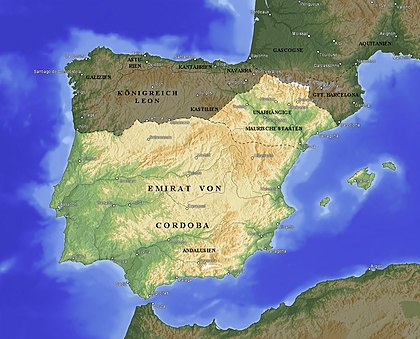Al-Andalus
al-Andalus (Arabic الأندلس, Central Atlas Tamazight ⴰⵏⴷⴰⵍⵓⵙ Andalus) is the Arabic name for the parts of the Iberian Peninsula ruled by Muslims between 711 and 1492. In terms of state law, al-Andalus was successively a province of the Umayyad Caliphate (711-750), founded by Caliph Al-Walid I, and of the Abbasid Caliphate (750-756), respectively. of the Abbasids (750-756), the Emirate of Córdoba (756-929), the Caliphate of Córdoba (929-1031), a group of "Taifa" (successor) kingdoms, and a province in the kingdoms of the North African Berber dynasties of the Almoravids and then the Almohads; eventually it again broke up into Taifa kingdoms. During long periods, especially at the time of the Caliphate of Córdoba, al-Andalus was a center of learning. Cordoba became a leading cultural and economic center of both the Mediterranean and the Islamic world.
From the early 8th century onwards, al-Andalus was in conflict with the Christian kingdoms in the north, who set out to reconquer Spain militarily as part of the Reconquista. In 1085, Alfonso VI of Castile conquered Toledo, beginning a gradual decline of al-Andalus. Eventually, after the fall of Cordoba in 1236, the Emirate of Granada remained as the last Muslim-ruled territory in what is now Spain. The Portuguese Reconquista ended with the conquest of the Algarve by Alfonso III in 1249/1250, and Granada became tributary to the kingdom of Castile ruled by Ferdinand III in 1238. Finally, on January 2, 1492, the last emir, Muhammad XII, surrendered Granada to Ferdinand II of Aragon and Isabella of Castile, Los Reyes Católicos (the "Catholic Monarchs"), bringing an end to Muslim rule in the Iberian Peninsula.

al-Andalus c. 910
List of the governors of al-Andalus
- 712-714 Musa ibn Nusayr
- 714-716 Abd al-Aziz ibn Musa
- 716-000 Ayub ibn Habib al-Lachmi
- 716-719 al-Hurr ibn Abd ar-Rahman
- 719-721 as-Samh ibn Malik al-Chawlani
- 721-000 Abd ar-Rahman ibn Abd Allah al-Ghafiqi
- 721-726 Anbasa ibn Suhaym al-Kalbi
- 726-000 Udhra ibn Abd Allah al-Fihri
- 726-728 Yahya ibn Sallama al-Kalbi
- 728-000 Hudhaifa ibn al-Ahwas al-Ashjah'i
- 728-729 Uthman ibn Abi Nas'a al-Chath'ami
- 729-730 al-Haitham ibn 'Ubaid al-Kanani
- 730-000 Muhammad ibn Abd Allah al-Ashjah'i
- 730-732 Abd ar-Rahman ibn Abd Allah al-Ghafiqi (2nd time)
- 732-734 Abd al-Malik ibn Qatan al-Fihri
- 734-740 Uqba ibn Hajjaj as-Saluli
- 740-742 Abd al-Malik ibn Qatan al-Fihri (2nd time)
- 742-000 Baldsh ibn Bishr
- 742-743 Tha'laba ibn Salama al-'Amili
- 743-745 Abu l-Chattar Husam ibn Darar al-Kalbi
- 745-746 Thawaba ibn Salama al-Jadhami
- 746-747 Abd ar-Rahman ibn Kabir al-Lahmi
- 747-756 Yusuf ibn Abd ar-Rahman al-Fihri
His successor, Abd ar-Rahman I, rose to become the first Emir of Córdoba, thus separating Andalusia from the Abbasid Caliphate.
Reception
In 1997, a network of roads in Spain was designated a Cultural Route by the Council of Europe. It was given the designation "The Heritage of al-Andalus".
Questions and Answers
Q: What was the Arabic name given to parts of the Iberian Peninsula governed by Muslims?
A: The Arabic name given to these parts of the Iberian Peninsula was Al-Andalus.
Q: Who were some of the rulers in Muslim Spain?
A: In Muslim Spain, there were rulers from the Umayyad Caliphate, the Caliphate of Córdoba (929-1031), and finally the Caliphate of Córdoba's taifa (successor) kingdoms.
Q: What made Muslim Spain famous for learning?
A: For large parts of its history, particularly under the Caliphate of Córdoba, Andalus was famous for learning and the city of Córdoba became one of the leading cultural and economic centers in both the Mediterranean basin and Islamic world. This civilization was quite advanced at architecture and urban planning.
Q: How did Moors become wealthy?
A: The Moors became wealthy because they controlled gold trade from Ghana Empire in West Africa.
Q: What type of population lived near Mediterranean coast during this time period?
A: Near Mediterranean coast during this time period there was a saqaliba population (the descendants of European slaves).
Q: When did Boabdil surrender complete control over Granada to Ferdinand and Isabella?
A: Boabdil surrendered complete control over Granada to Ferdinand and Isabella on January 2nd 1492.
Search within the encyclopedia